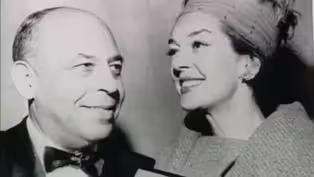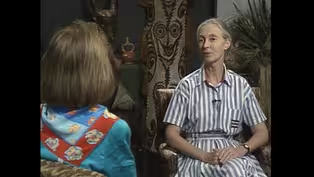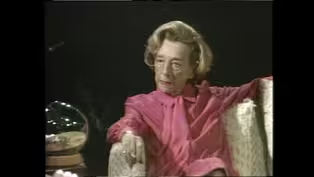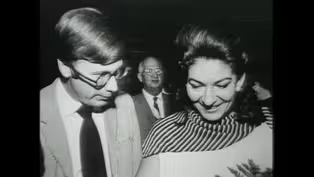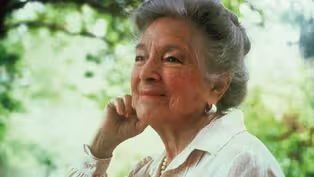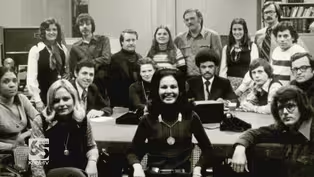From the Archives
Newsroom: Desegregation
Special | 44m 41sVideo has Closed Captions
Newsroom was KERA's groundbreaking program of live local news analysis hosted by Jim Lehrer.
Newsroom was KERA's groundbreaking program of live local news analysis and opinion hosted by Jim Lehrer. The live roundtable discussion was filmed in the KERA studios. This August 3, 1971, episode was extended coverage of the plan to desegregate Dallas schools, specifically examining how Judge William Taylor's plan affected the Oak Cliff section of Dallas.
Problems playing video? | Closed Captioning Feedback
Problems playing video? | Closed Captioning Feedback
From the Archives is a local public television program presented by KERA
From the Archives
Newsroom: Desegregation
Special | 44m 41sVideo has Closed Captions
Newsroom was KERA's groundbreaking program of live local news analysis and opinion hosted by Jim Lehrer. The live roundtable discussion was filmed in the KERA studios. This August 3, 1971, episode was extended coverage of the plan to desegregate Dallas schools, specifically examining how Judge William Taylor's plan affected the Oak Cliff section of Dallas.
Problems playing video? | Closed Captioning Feedback
How to Watch From the Archives
From the Archives is available to stream on pbs.org and the free PBS App, available on iPhone, Apple TV, Android TV, Android smartphones, Amazon Fire TV, Amazon Fire Tablet, Roku, Samsung Smart TV, and Vizio.
More from This Collection
Swank in the Arts: Richard Avedon
Richard Avedon discusses photography, his inspirations, and The Amon Carter's IN THE AMERICAN WEST. (29m 15s)
Nowhere But Texas 1 nostalgically explores fascinating but seldom-heard Texas stories. (58m 16s)
Legacies of the Land: A Tale of Texas
The show is an armchair tour through the legends, tall tales, and oil wells that pervade Texas land. (59m 25s)
A Conversation with Stanley Marcus
Stanley Marcus discusses how he transformed a small specialty shop into a global retail business. (26m 5s)
A Conversation with Jane Goodall
In 1990, journalist Lee Cullum talked with ethologist and conservation activist Dr. Jane Goodall as (29m 21s)
With Ossie & Ruby: Solo Song for Doc
a 1940s-era drama about Doc Craft, a dining car waiter who realizes his company wants him to retire. (29m 18s)
With Ossie & Ruby: Ghost Stories
The episode, “Ghost Stories,” aired in April 1982, with special guest, respected (30m 15s)
Profile: Lillian Hellman, Episode 4
Lillian Hellman discusses her financial struggles, her partner Dashiell Hammett, and her childhood. (29m 32s)
Profile: Lillian Hellman, Episode 3
Writer Lillian Hellman discusses the McCarthy era, Watergate, and her perspective on leadership. (29m 5s)
Swank in the Arts: John Ardoin profile on Maria Callas
Video has Closed Captions
Patsy Swank talks to then-Dallas Morning News music critic John Ardoin for a profile on his friend, (29m 43s)
Business Edition with David Johnson: Howard Putnam, Braniff
David Johnson speaks with CEO Howard Putnam, who speaks positively about Braniff's outlook. (28m 46s)
Video has Closed Captions
Helen Hayes invites viewers to celebrate some of America’s greatest treasures - wildflowers! (27m 40s)
Providing Support for PBS.org
Learn Moreabout PBS online sponsorship(music) (music) (music) I'm Jim Lehrer and this is newsroom, a program of local news, analysis and opinion.
Our coverage of the desegregation of the Dallas schools continues tonight with a specific look at how judge Taylor's desegregation plan affects the Oak Cliff section of Dallas.
We have four guests in connection with this discussion.
They are R.B.
Carpenter, president of the Oak Cliff Chamber of Commerce.
Councilman Jerry Gilmore, who represents Oak Cliff on the Dallas City Council.
Eugene Smith, vice president of the Dallas School Board and a resident of Oak Cliff and school board member Tom Williams, who represents Oak Cliff on the school board.
We're also going to take a quick look at hamburgers, among other things, tonight.
Remember feedback?
Our number is 2638581.
Desegregation in the Dallas schools.
Well we received more than 650 feedback calls last night during the two hours plus that we were on the air with our special newsroom edition explaining Judge Taylor's order.
And then the discussion that followed.
Many of the calls centered around questions and complaints and expressions of reaction from people who live in the Oak Cliff area, who feel, as do many blacks, that the burden of bussing aspects of Judge Taylor's plan at the junior high and high school level, the burden of it falls to them.
In light of those calls last night and other developments today in the Oak Cliff area of the city, we decided to specifically examine the situation in Oak Cliff.
As I said, the Oak Cliff white residents seem to feel along with blacks generally, that they have caught the major part of the desegregation burden.
Let's begin with Harlan Cohen, who will lay out exactly what the situation is in Oak Cliff in terms of Judge Taylor's order.
Harlan.
Jim, as you mentioned, a tremendous amount of last night's feedback focused on what's going to happen in the Oak Cliff area under the plan, which Judge Taylor announced yesterday morning and most of that feedback carried a tone of anger or frustration arising from a feeling that the plan has a much more disruptive effect in Oak Cliff than in any other part of Dallas.
Well, what we did today was to take a close look at specifically how the plan affects the Oak Cliff area and then generally compare this with how the plan affects the rest of the city.
As you can see in this map, the Oak Cliff area basically represents the southwest quadrant of the school district and this quadrant has the highest percentage of blacks of any in the school district.
Elementary zones in the area will remain the same as they were this past year, which is true all over the city.
And the elementary schools in Oak Cliff will be placed in clusters for the purpose of TV integration.
And field trips.
Just as will happen to elementary schools throughout Dallas.
So at the elementary level, Oak Cliff is no different than any other area in the city.
However, there is a difference between Oak Cliff and the remainder of Dallas at the secondary level.
As you will, I think very clearly see first, the high schools, there were some zone changes in Oak Cliff high schools, as there were in high schools all over the city.
However, contiguous zone changes often were not sufficient to achieve adequate racial mixing in these cases, satellite was used.
Satellite zoning was used outside of Oak Cliff and grouping was used in Oak Cliff.
You can see the concept of satellite zoning on this map of the Hillcrest High School zone.
Black Hills in North Dallas, right?
Yeah.
Black high school students living in the Frazier and the Ray elementary zones.
Those two small red or dark colored areas in the middle of the school district would attend Hillcrest High School Zone, which is that large red area at the top of the map.
This, in other words, the two small areas are satellite zones to that main Hillcrest zone.
At the top of the map.
This satellite zoning was used primarily in North Dallas for the purpose of achieving racial mixing.
As you can see in this map, which covers all the satellite zoning which is involved in the plan throughout the city.
The plan that Judge Taylor did announce yesterday in Oak Cliff, however, rather than satellite zoning grouping, was used when zone changes alone, contiguous zone changes were insufficient for adequate racial mixing.
As you can see in this map, Carter South Oak Cliff and Kimball High schools were grouped together with all 12th grade students attending the school to which they are zoned.
All 11th grade students in all three zones attending the South Oak Cliff school and the Carter and Kimball schools, retaining their regular 10th grades and South Oak Cliff's 10th grade being divided between the other two, Carter and Kimball.
It's this process of interchange among the group schools which achieves the adequate racial mixture.
Comparing the effects at this high school level of grouping in Oak Cliff with satellites in the rest of the city.
Approximately 1984 students in the Oak Cliff area were require transportation to get to school, though they may choose private transportation rather than bussing.
While in the remainder of the school district, approximately 3239 students will require transportation because of satellite.
I say these figures are approximate because they were based on the available data, which we had.
We didn't round off, but given the data we had, we should say that they are approximate.
Though they're probably pretty close.
Much the same situation applies at the junior high level when contiguous zoning changes were not sufficient for adequate racial mixing in areas outside Oak Cliff, satellite zoning was used just as is true at the high school level again.
In Oak Cliff.
However, rather than satellite zoning, grouping was used, the Atwell Brown, Hulsey, storey and Zumwalt Junior highs were grouped as you see in this map.
That's the yellow or light colored group at the bottom of Oak Cliff and the story Edison and Sequoia Junior highs were grouped.
That's the red or dark colored group at the top left hand side of Oak Cliff.
As you see in the map.
As with the high school group, there's an interchange at each grade level within each group to achieve adequate racial mixing.
Again, to go to the figures, the total number of junior high school students in Oak Cliff who will be transportation because of grouping is approximately 7852, while the total number of junior high school students in the rest of the city who will need transportation because of satellites is approximately 1880.
That's quite a difference between Oak Cliff and the rest of the city.
That's at the junior high.
That's at the junior high level.
Now, if we look at the high schools and the junior high schools together, two facts are apparent.
First, Oak Cliff is the only area where whites are moved in substantial numbers, along with blacks because of grouping as opposed to little movement of whites in the rest of the city.
Because of satellite and second, in terms of just quantities, approximately 9836 secondary school students in Oak Cliff will require transportation because of grouping in that area, while only about 5119 secondary students in the rest of the city are going to require transportation because of satellite zoning.
And that numerical comparison pretty well tells the story.
All right, Harlan.
Many of the complaints that we have received today and last night from Oak Cliff residents centered around the question that or around the point that a child would go could conceivably go to six different schools or make six different moves in a course of six years or worse, that or something similar to that.
All right.
Let's take a specific example, say, of Carpenter Elementary School in Oak Cliff.
Okay.
If you look at the Carpenter Elementary School, the student goes there for all his six years.
So that's Carpenter Elementary School at the sixth grade.
Then at the seventh grade, the student goes to the Brown Junior High in the eighth grade, he goes to story Junior High.
In the ninth grade, he goes to the Atwell Junior High.
Those three schools are part of the junior high group.
He then moved on to the high school group and in the 10th grade he'd go to Kimball High School in the 11th grade, child would go to the South Oak Cliff High School.
Then in the 12th grade, he'd go back to Kimball.
But that's not a new school.
He'd been there before in the 10th.
But for those six years, from sixth grade through 11th grade, he would attend six different schools.
All right.
Now, this particular case, Carpenter is now a predominantly white school.
Right.
But there are similar situations that involve the movement of blacks.
The same way.
If they now go attend a predominantly black school.
Is that correct?
That's if you look at the schools that are were in the South Oak Cliff High School zone, I picked out Bushman school where a student would go to the sixth grade and Bushman seventh.
Hulsey, eighth, Zumwalt ninth as well.
10th Carter and 11th and 12th.
South Oak Cliff.
Again, that's six different schools and six different years.
All right.
Now, are there any comparable situations like this anywhere else in the city in North Dallas or anywhere?
None.
None.
At least that we could find in any part of the city.
Except Oak Cliff.
And even to be more specific, none except in the lower half of Oak Cliff, where that high school group exists.
Okay.
Thank you.
Harlan.
All right.
Now let's go now to our discussion as the Oak Cliff Chamber of Commerce held a special meeting at 3:00 this afternoon to discuss the desegregation plan.
And specific terms of its community.
And I'd like first to go to Mr. Carpenter.
Mr. R.B.
Carpenter, who is the president of the Chamber of Commerce.
Mr. Carpenter.
First of all, what was the mood of the meeting or what generally is the general reaction in the Oak Cliff community to what has happened or what has been ordered by Judge Taylor, thus far?
Well, when the impact of the Dallas News hit the public today in the communities, it was kind of quiet for a while.
And then it kind of got into a hysteria, really, because some of the people really got up in arms and there was willing to do anything practically to overcome this situation.
And they began to ring at the Chamber of Commerce.
And they rang me at my office and we.
Hastily called a meeting at 3:00 and had some 30.
Leaders of Oak Cliff to get together to try to see what we could do to calm this situation.
We ask our school board representative to attend, in which they did.
We had a very fine meeting.
We are writing some resolutions now that will be presented to the school board tomorrow.
We have the thing that's really got us thinking is our economic condition.
That is causing an oak cliff.
We had several realtors there that had as many as 12 requests to sell their homes, regardless of what it is, because there wasn't going to bust their children.
We've had request of people moving out of our local apartments in Oak Cliff into other apartments in other parts of town, North Dallas, DeSoto.
We think it's going to be a terrific deal when it comes to economic conditions.
We have a some industrial properties that we have been working on for all these years.
It's going to come to just an impasse.
What kind of resolutions did you pass this afternoon?
Well, we haven't written them as at this time, but could you give a resolutions are to the school board and to the effect that we're asking them to work to counter this thing in, New Orleans?
Mr. Gilmore, as a member of the Dallas City Council and a resident of Oak Cliff, what do you have to say this evening to the people of Oak Cliff?
About this situation?
Thank you.
Jim, you recall I was on the program about a month ago when this first came up.
At that time, I felt strongly that the impact of any judges decision would affect the entire people of the city of Dallas at that time, I had no idea that the major impact was going to be on the area where I lived.
And so I have the same feelings more intensified now that I had a month ago.
My own personal reaction is that I feel like the court has way overstepped its boundary, and the in particular area, for example, of the South Oak Cliff High School in that there is probably no better example of a de facto segregated high school anywhere than South Oak Cliff.
It was a constructed, I suppose, in about 1952 or 53.
It was an all white high school.
Through no changes in boundary lines or significant changes in boundary lines or anything else.
The neighborhoods, the character of the neighborhood changed.
And as a result became black and therefore the school became black.
And in my opinion, the judge went way beyond the proper limits of a of correcting what amounted to a de facto segregated school and imposed a great hardship on one section of the city.
I have suggested that there are many courses that we can take, and if specific answer to your question, what would I say to the people of Oak Cliff?
Is that we are doing something we have had our meeting.
We're we have we're going to ask the school board to perfect a cross appeal.
We have discussed the possibility of employing counsel and filing an amicus curiae brief.
We've discussed the possibility of the school board appealing to the Supreme Court or some interested citizens in Oak Cliff, appealing directly to the Supreme Court to get a stay order on the entire order of Judge Taylor until such time as the question of the unfairness or the inequity of the judgment.
As affects one portion of the city concerns.
Now, you you may or may not recall about a month ago, my major concern was not that that we were against desegregation.
We're for we're far quality education.
I was again at that time and more concerned now that unless we look at this question on a much broader basis than just Oak Cliff or the city of Dallas, but rather go to the metropolitan area and perhaps pursue the remedy of getting the federal courts to consider the metropolitan area as a geographic, economic, educational entity.
And order its desegregation on that basis.
Then I think you're going to have the white flight that judge Taylor said he was trying to avoid.
And the calls that I've gotten today and the calls that the other people that I've talked to today indicate a great deal of concern, no threats of violence, no threats of violating the court order, just simple resolve that unless something fair can be worked out citywide or metropolitan wide, that the people feel that it would be fairer to move out of the community.
Now, I would hope that people would stay.
I'm going to stay.
Most of the people I've talked to are going to stay and work the problems out.
We're trying to do this on a calm basis, and at the same time assure the people that something is being done and that leadership is coming to the front to perfect whatever appeal we can on the representing the people of Oak Cliff.
Okay.
I want to come back to a couple of points.
You raised in just a minute.
But first of all, I want to go to members of the school board who are with us.
Mr. Smith, Vice president of the board and Mr. Williams, a member of the board.
Both these gentlemen have spoken already in terms of appealing to the school board to do something.
Both of you gentlemen, not only members of the school board, you're also residents of Oak Cliff.
What can you, as members of the school board or what can the school board in concert do at this point?
Beginning with you?
Mr. Smith?
Jim, I appreciate the opportunity to be here as a member resident in Oak Cliff.
And the thing that concerns me is the inequity of this entire ruling over the entire city of Dallas.
In many ways, that the secondary level and especially in the Oak Cliff area and I have been talking to members of the community and hope to be able to talk to the members of the school board in the area of filing across appeal.
Now, what is a cross appeal?
This would be the school board taking action to ask relief at the Appellate area.
As I understand it, to the program, as outlined by the judge in the especially the secondary level.
Okay, the plaintiffs have already filed a notice of appeal.
This would be an additional appeal on different grounds.
Is that is that correct?
And it would be filed by the you're trying to get the school board to do this.
Correct?
Right, Jim.
It's not it's not unusual in a school case that both sides would appeal.
That has happened before.
And there is precedent for that.
Yeah, yeah.
Okay.
Mr. Williams, First of all, Jim, I'd like to say that I very much favor desegregation and quality education for all children, regardless of race.
I don't feel that this plan in the south half of Oak Cliff is educationally sound in the secondary education section of it, I feel it's unfair for students to have to go to five schools during their junior high school and senior high school periods, and my feeling is that I must ask other board members to go along with me and filing a cross appeal on this case.
All right, gentlemen.
To go back now, you're going to attempt to get across appeal file.
But let's for discussion purposes, assume that.
No, that judge Taylor's order becomes the law of the land.
I mean, that's what is going to happen.
What are you as leaders in Oak Cliff, going to do to prevent some of the problems in the hysteria that has developed up to this point?
Mr. Gilmore?
Well, I mentioned at our meeting today something that probably wouldn't be very popular.
Other places.
But if in fact, the judgment becomes the law of the land, I would like to suggest that the school board apply the same type of desegregation to citywide.
That is, if it's good to parish schools in Oak Cliff and have layers of integration on 10th grade at one school, why not do it in Bryan Adams?
And why not do it in Samuel and Hillcrest?
And Thomas Jefferson?
And I think this is there's nothing that would prevent the school board from going a step beyond what the court ordered.
And certainly they could do that.
Mr. Carpenter, I want to ask you the question on that same lines.
Many of the people that I talked to today from Oak Cliff who are upset about this, they were upset about the having to go to five different schools, etc, but they were also upset about the additional factor that North Dallas, the people in North Dallas are not being affected.
The same way.
Is this underlying most of some of the complaints down there?
Yes, it is.
They feel like they've been discriminated against because the way if the city as a whole would be bussing, I don't think you'd have too much complaint at all.
But just to pick out one area in this city of Dallas of ours and discriminate against that one area, I just don't think it's fair.
And that people of Oak Cliff don't think it's fair.
Well, now, what about some of the specific problems now that that are, for instance, like people fleeing the area down there, is this you consider this a very real problem.
What can be done to prevent that?
Well, we don't know.
We are hoping that it will settle down and they'll try to look at it on a little sane basis, little saner basis than it is.
And we want to assure the people in Oak Cliff that the Chamber of Commerce and the leaders in Oak Cliff are going to do everything in their power legally to remedy.
We think, what is the wrong okay.
What?
Mr. Williams, from a what do you think the chances would be of the school board going a step further, say in implementing this order citywide?
Well, we're not real sure yet.
We I we've all been thinking about this since the judge made his pronounced his order and studying it and digesting it.
And we really haven't had a chance to talk to all the other members and but I think there's a fair chance of there seeing this problem as we do.
Yes.
Mr. Gilmore, go ahead.
Yes.
Lee.
Sorry, I just have a question for all four of you.
I've been hogging it all down here.
Go ahead.
I know you're all Oak Cliff leaders, but your citywide leaders also, three of you were elected at large.
Mr. Carpenter served on the city council, elected at large.
You all came up through a mold of leadership that frowns on sectionalism.
The charter association, the Committee for Good Schools.
Do you feel torn in this matter?
Do you feel you should join other city fathers and call for unity?
Oh, I think the city fathers should join us in this thing because we have one city and we've all devoted many, many hours to these different civic enterprises.
And why they they pick one little segment of the city.
I don't understand it.
Well, of course, we have served many, many Arizona city Council and other things in this city.
You're saying then that the city fathers from other parts of the city should join you in this sectional battle?
That's right.
Lee, I think if you read the charter and it's a very complex order, I was in court yesterday when it was announced and I got a copy of the order from the city attorney as soon as we started our city council meeting.
I read it last night and it is a very complex order for example, one of the possibilities that has being pursued at this time is what is the power of the Ethnic Committee?
Can the Committee for example, seeing that there is a great inequity citywide from just picking out one section of the city, can the ethnic Committee suggest back to the court a change in its basic alignment of its order in order to remove this inequity?
And as I read the order and the judge retained jurisdiction as I read the order, the court could very well change that specific aspect of its order in order to carry out the overall intent of his of his judgment, that is to say, I want an order that gets good education in order, that gets it fairly distributed throughout the city.
But prevents white flight.
And I think that unless he goes back and looks again at this and it's a very unusual in my opinion, as a lawyer for the judge to be able to come back in and change an order.
But as I read the order again, it's a very complex, very long order.
The judge could may very well have the power to do that in order to realign some of these things.
Yes, sir.
I'd like to bring up another point.
Jim.
If we have a wholesale exodus of apartments, for instance, they moved just across the line.
Such to get into another school district and then we have a drop off in their industrial divisions and our employment.
It not only going to hurt Oak Cliff, it's going to hurt Dallas in general.
We're going to lose a lot of money in taxes.
And at this particular time, we sure don't need to lose any money in taxes with our airport coming up and all of our expenses at City Hall.
But it it not only works on Oak Cliff, but this thing has a terrific impact on the city as a whole.
All right, Mr. Smith, let me ask you a question.
The point that Mr. Gilmore raised, which was that that maybe school integration would segregation should be attacked from a county or regional wide basis.
Do you agree with that?
This particular idea came up during the trial, I think, on the stand by Pete Williams and the fact that he brought up the fact that in order to prevent white flight, possibly in a metropolitan area such as Dallas, that it might be necessary to include the entire county.
And I have no opinion, particularly at this time on this.
And I say our attentions have been devoted in trying to look at what the ramifications of this order are.
And on September 7th, when schools open to be able to try to provide a quality education to the students of Dallas and there have been some monumental problems given to the board and to the administrative personnel in our school system.
And being able to provide good education, especially in the Oak Cliff sector.
Well, yes.
Go ahead.
Greg, I was just wondering most of you have mentioned the white flying phenomenon, and I was I was wondering to you, I mean, rather, Councilman Gilmore, I was on doctor Banker who was on the program last night, said that he didn't believe that whites could could afford economically, could afford to just pack up, say, after 20 and 25 year investments in a home.
Is that is that true?
Is that just a theory or what?
Is that true?
Can they afford that?
Unfortunately, I think that's a theory of a college professor.
And I have many good friends who are college professors.
But I have talked to many people today.
One was made reference to today.
He has a farm.
In another county.
He'll take whatever loss he has to take on his home and move away.
It happened in many sections of the southeastern section of Oak Cliff of people moving out of Glendale once, once the color line was broken, many people didn't flee to another section of Dallas.
They fled to suburbs.
What can what can the leadership of Oak Cliff do to prevent this sort of thing?
Hopefully, what we're doing, hopefully our committee is being set up to try to make this thing work down there.
If in fact it becomes the final order.
Well, again, through the Council of Churches, I know all the churches are working.
Long hours to try to keep calm and reason and understanding between the people and trying to encourage this and I personally feel that this is the answer, not to run from the problem, but to stay and work it out with brother understanding and love.
But not all people, not all people accept that philosophy.
I'm referring.
What about you gentlemen?
Are you planning on staying in Oak Cliff, or are you planning on sending your children to private schools or what?
Mr. Williams?
Well, I'd like to answer again to Lee.
There.
I live in an area in Oak Cliff that's not affected by this radical thing yet.
I can see that it would have an effect eventually on this area as well as other parts of town, and I certainly don't plan to leave town.
And I have one girl in high school.
She happens to be in a senior in skyline this year, and she's my last of four.
So I can't.
Take very a very strong stand there.
What about the rest of you gentlemen?
You have children that are affected by this.
I have, boy, that'll be in the sixth grade this year.
And a girl will be in the fifth grade, and I'm sitting there being confronted with the possibility that my children will be in five schools in six years, with six changes.
And at this time, I have no plans to move.
I think that there are many avenues of due process that are left to us, and I plan to stay where I am and see this thing through.
Mr. Gilmore.
Mr. Carton.
Well, I'm.
I'm staying where I am.
We more or less guinea pig.
The additions and my children are all grown.
I have five grandchildren, though, that it will affect if they stay where they are.
Now.
I'm not so sure they will, but if they decide to stay, they'll just have to take the consequences.
But I just don't believe they will.
Miss Gilmore, I'm going to stay where I am.
I'm close to Tom's residence.
My children will go to the same elementary, junior high and high school, and so I'm personally not affected.
I'm going to stay there.
I have three children and first, third and fifth grades.
This coming fall.
Whenever school starts.
Okay.
Let me.
That's we'll be right back to them.
Lee, let me summarize here quickly.
If I understand y'all's position is that the first thing you're going to try to do is to get the school board to file a cross appeal.
The second thing, if that does not work, is to get the school board to expand the court order to affect the city as a whole.
And it's probably not fair to say that these other three people, that's my idea.
Okay?
I don't want to hang that around their necks.
Okay?
And then the if that doesn't work, then you you are going to try to work to make it make Judge Taylor's plan, work in Oak Cliff as it's written today.
Is that is that a summary of y'all's.
I'd like to add to that the possibility of approaching the tri ethnic committee within the ethnic Committee is another possibility.
Yes.
Okay.
And there is a possibility, I believe, that we might try to get some legal counsel and carry it to a higher court.
Okay.
All right.
Gentlemen, I'll be right back to you in a few minutes.
On feedback.
We're going to go back to the desegregation case.
Generally in just a minute.
But now we're going to take a short look at a film about American tradition, about an American tradition.
It was taken at a burger King at Lemmon and Douglas by Ken Harrison.
And Rob Tranchin.
You might characterize it as a tribute of sorts.
Hamburger hijinks are sweeping the nation in every burg and hamlet.
One can hear the now familiar cry, May I have a hamburger, please?
Bringing a spirit of can do to the task at hand.
The wheels of hamburger know how are set into motion.
But burger aficionados do not live by bread and meat alone.
They demand exotic embellishments such as onions, tomatoes and catsup.
Each day across the land, millions of these culinary cuties are constructed to quell the craving for jolly old Mr.
Hamburger.
And so, after a heartfelt thank you, there's nothing left to do but savor this excellent repast.
Hats off to the hamburger.
Work of Ken Harrison and Rob.
All right.
Continuing on with the desegregation, there were developments today.
Some key developments today in the Austin case.
Martin Frost, attorneys for the U.S. Department of Justice.
This afternoon filed an appeal in the Austin Integration case, an action that could have an impact on Dallas.
Today was the deadline for filing an appeal in the Austin case, and considerable pressure apparently was applied at the national level to prevent the government from appealing the Houston Post reported Sunday that Senator John Tower had told President Nixon that Mr. Nixon would lose Texas in 1972 if his administration appealed.
The Austin order.
The Times Herald today carried a story on page one stating that Treasury Secretary John Connally had attended a noon meeting at the white House today to discuss the possibility of the appeal.
The Austin case could potentially affect the fate of Judge Taylor's ruling in Dallas.
Federal judge Jack Roberts several weeks ago approved a plan for Austin that rejected cross-town bussing, retained neighborhood elementary schools and provided for part time integration that is, physical integration for only 25% of the school day through student exchanges.
Judge Taylor's ruling also rejected cross-town bussing and provided for part time integration in the form of one hour a day television contact and three hours a week in student exchanges.
Should the Austin case be decided before the Dallas case, it will provide insight into the Fifth Circuit's views on part time integration.
Attorney General John Mitchell made the announcement in Washington today that the Austin case would be appealed in so doing, he said, the ruling by Judge Roberts does not comply with prior decisions of higher courts, including the recent Supreme Court decision in the Swann case.
He said the Fifth Circuit Court will be asked to order the Austin district to draw a new plan.
Okay.
Thank you.
And that certainly has could have as you say, if it goes the route before the Dallas case, it's already begun to do.
It could have some some fallout in terms of what will eventually happen to the Dallas case and to the Fort Worth case.
And because Austin is a smaller city and a smaller school district, it is certainly possible that the Fifth Circuit would consider that case first before a more involved case involving a city like Dallas.
Okay.
Thank you, Martin.
All right.
Back to Dallas, specifically the Dallas Times Herald.
Editorially commented on Judge Taylor's plan this afternoon in the Dallas Morning News will do the same in the morning.
Max Woodfin, Jim, as you say, both newspapers have now taken editorial stands on the desegregation plan.
Both of them, for the most part, are urging cooperation to make the plan work.
However, the morning news being a little bit more hesitant, the times Herald today endorsed Judge Taylor's desegregation plans, with almost no qualifications.
The editors called the television program innovative, noted that television will prevent massive bussing.
They do note that the millions to be spent on either television or bussing might better be spent on, quote, other educational programs, but there appears no other way to meet the Supreme Court's criteria, unquote.
The editorial concludes with this sentence we believe that Judge Taylor's plan is workable.
A workable one, and we urge that all citizens of Dallas White, black and brown do their utmost to see that his orders are carried out in a spirit of goodwill and cooperation.
The morning news and the lead editorial, the Tomorrow Morning's edition follow almost the same line.
They say that the desegregation plan has been decided and go on, let us therefore consider our actions and our words in that light, and heed our duties as parents and as citizens.
I praise Judge Taylor, saying the judge worked within limits of concepts laid down by the Supreme Court, concepts which the news believes to be basically impractical, unjust and short sighted.
The news goes on to criticize the Supreme Court, then comes back to the plan, praising it again, saying in short, the plan is imperfect, but not impossible or impracticable.
Though it is unlikely that many citizens will approve of all of it.
The news believes that most can live with it.
That conclude with the decision has been made.
The plan has been set as policy.
Let us all turn our attention and our efforts to the challenge of making it work.
Okay.
Thank you Max.
Our thanks to the Dallas Morning News for making a copy of that editorial available to us prior to its publication.
Of course, it'll be in the in the morning paper.
All right, let's go to feedback.
We've got a lot, as could be expected, school desegregation, specifically Oak Cliff here is a person with a.
Wait a minute.
You wanted to ask a question, Harlan, before we went to feedback?
Yeah, I just I just wanted to ask the board.
Mr. Williams, you specifically talked about convincing other board members of what's happened in South Oak Cliff, and either that it should be changed or that possibly what's happening there should be extended to the rest of the city.
And at the same time, the school administration has already said that it's going.
Ahead full steam with with plans for implementing Judge Taylor's orders.
As a matter of fact, there's a board meeting at 3:00 tomorrow to hear recommendations from Doctor Estes and presumably to get board approval where that approval is necessary to make a implement.
Any plans necessary for implementing the court's decision.
Are you going?
Are you going to go ahead full steam at the same time trying to convince board members to change?
We have voted to implement the orders of the of the court.
I specifically asked the other day if this eliminated the possibility of our appealing it.
It doesn't weather I don't I would hate to think that this kind of treatment would have to spread all over the city.
I don't suggest such a thing.
And I'm not sure.
Did I answer all your questions?
Okay, well, let's.
Here's somebody caller has a recommendation, which is that the school board disregard all boundary lines and permit students to go to any school they want to.
Either one of you school board members want to comment on the recommendation.
That's freedom of choice.
What's commonly called freedom of choice.
Right.
And I believe that's been held by the courts to be unconstitutional in this particular area.
Okay.
Somebody says it takes two hands to handle a whopper hamburger.
Okay.
What precisely did Judge Taylor base his decision in coming up with a plan?
He used for Oak Cliff?
Well, there's a the only thing we could only speculate there.
The housing patterns of the residential patterns.
If you look, if you look at the housing patterns in order to move those blacks living there up to North Dallas, either you'd have to have long finger like zones, which is what Ted tech recommended, but which would require a large amount of bussing.
Or you'd have to.
Use Noncontiguous zoning.
Both of which required amount of transportation.
The Judge Taylor specifically said he didn't want to use the way it's arranged right now.
They're still transportation necessary, but its contiguous zoning, so the transportation is at least less in terms of total amount of time than it might otherwise have to be.
That's the best we can come up with as an explanation for why he did what he did.
Evidently he was trying to minimize the total amount of bussing and maximize the amount of contiguous zoning or grouping.
Okay, what is the legal definition of a racially integrated school district?
Martin.
That's something which the appellate courts are still addressing themselves to.
And every time you have a case go up, the court says yes or no, it doesn't say what what the definition is.
It only says either you are or you aren't.
We can truthfully say that that has been a national argument since 1954 to the present.
Okay.
The school board has exchanged racial discrimination for economic discrimination.
Is that comment?
It looks like the senior citizens will have to pack up and leave Dallas, as they will not will be able to they will not be able to afford the taxes.
Apparently referring to the costs of this.
This plan.
Wouldn't it be more logical to compare the total miles traveled instead of the number of students bussed?
Well, yeah, that's one way of comparing it.
What?
What I and I agree with that.
That's one way of comparing it.
What this shows though, is that within a relatively small area of the city, more transportation is taking place than in all the rest of the city.
Total.
Mr. Carpenter, are any members of the Oak Cliff Chamber of Commerce black?
And if so, how many?
I don't recall just how many we have several blacks, members of the Oak Cliff chamber.
Okay.
Pettis, Norman's on the board.
Yeah.
All right.
But he's in San Diego.
He was in Dallas yesterday.
He was before the city council.
So.
Okay, you know, we're not against integration or anything of that nature.
We're just against bussing as as it is called for.
And where and where its discriminated against.
A small portion of the city of Dallas.
Jim, if you'll let me interject something, I had a group of people suggest to me that rather humorous solution to the problem.
They said that no one objects to putting their child in a taxi and sending a child to school by taxi.
And suppose we could solve the whole by taxing our children to school rather than bussing?
Nobody is against taxing, so it may be a solution.
All right, gentlemen, this is directed at all of you.
It says, what do you want?
The solution to be in relationship to the 4 or 5 that have been laid out?
Jim, I believe that the Dallas Independent School District, in their plan, laid out an equitable secondary program for the integration of the secondary schools in Dallas and as I think that this particular plan was as fair to all segments of the community as could be with contiguous zoning and a minimum of satellite in order to bring about this area.
But I think in taking the current situation, what would you consider of all the 4 or 5 solutions that have been outlined here, which would you prefer?
As I say, I'm in favor of an appeal of the secondary program, and so.
Okay.
All right.
I'm sorry, Mr. Gilmore.
I would I would be in favor of an appeal in order to try to get the, the appellate court to affirm the board's plan that it presented.
I think it was a very fair program that got quality education to everybody in the both of you all agree with that.
The appeal is the best.
I do.
Okay.
If the same proportion being bussed were in North Dallas, would it be acceptable to you gentlemen?
That it would ease some of their pain?
Some of the people's thinking, if it it should be one law for all and all for one law.
I don't think that we've come to the conclusion here that we've got a law for one set of residents and one part of town, another law for someone else.
Jim, I would still feel, though, that this is an awkward way of giving children education.
1234 through the grades, the man says, gentlemen, please be specific.
What are you going to do to prevent white flight?
No, cliff.
Well, I again, I think that's an individual, a personal question that each individual in his own conscience is going to have to decide.
And I think all we can do as leaders of Oak Cliff are supposed leaders of Oak Cliff is to try to live by example.
What we would think other people ought to do, and urge people to do the same.
And stay in the city and solve the problems rather than run from them.
What will happen with the Oak Cliff?
Citizens refuse to pay their school taxes?
Same thing happens to everybody else who chooses to pay their school taxes, says, I think the school decision affected those who could least afford to bus.
I feel that you can't just integrate from the secondary level.
You must start when the children are small before they develop prejudices.
That was that was that comment.
Will there be busses furnished by the school under this plan?
Transportation is to provided by the school either by providing busses or by provide or by providing the students with bus cards or tokens to be used on the public transit system.
Are there any Oak Cliff members on the tri ethnic Committee?
There's one.
Is it 1 or 2?
Don Jarvis.
Don Jarvis, Trinity, Trini Garza yeah, that's right.
Okay.
Let's see.
Is there any way to communicate to Dallas people that the greatest education is exposure to different cultures and races?
Why did the court pick Oak Cliff to bear the brunt of the desegregation case?
We've already attempted to answer that.
Let's see.
How are they going to determine which children from a certain school will be bussed?
That's determined in the plan.
Okay.
Papers and news media refer to the plaintiffs who are the plaintiffs.
What are who are the real plaintiffs?
In other words, who is who is behind the legal services money and research?
The plaintiffs are not the ones behind the money.
And research.
It's just a group of minority group people.
21 people, right?
Right.
And the suit was brought by these 21 people on behalf of their of their children.
Right.
As a class action, as a class action, gentlemen, we thank all four of you for being with us tonight.
And we're out of time.
Thank you and good night.
(music) (music) (music) (music) This program has been made possible by special grants from the Wylie Foundation and the Ford Foundation.
And by the citizen members of channel 13.
This has been a production of KERA TV Dallas Fort Worth
A look back on KERA's "Newsroom" with Bob Ray Sanders and Lee Cullum
Clip: Special | 9m 59s | Bob Ray Sanders and Lee Cullum reflect on what it was like to work on KERA's "Newsroom." (9m 59s)
Providing Support for PBS.org
Learn Moreabout PBS online sponsorshipSupport for PBS provided by:
From the Archives is a local public television program presented by KERA



